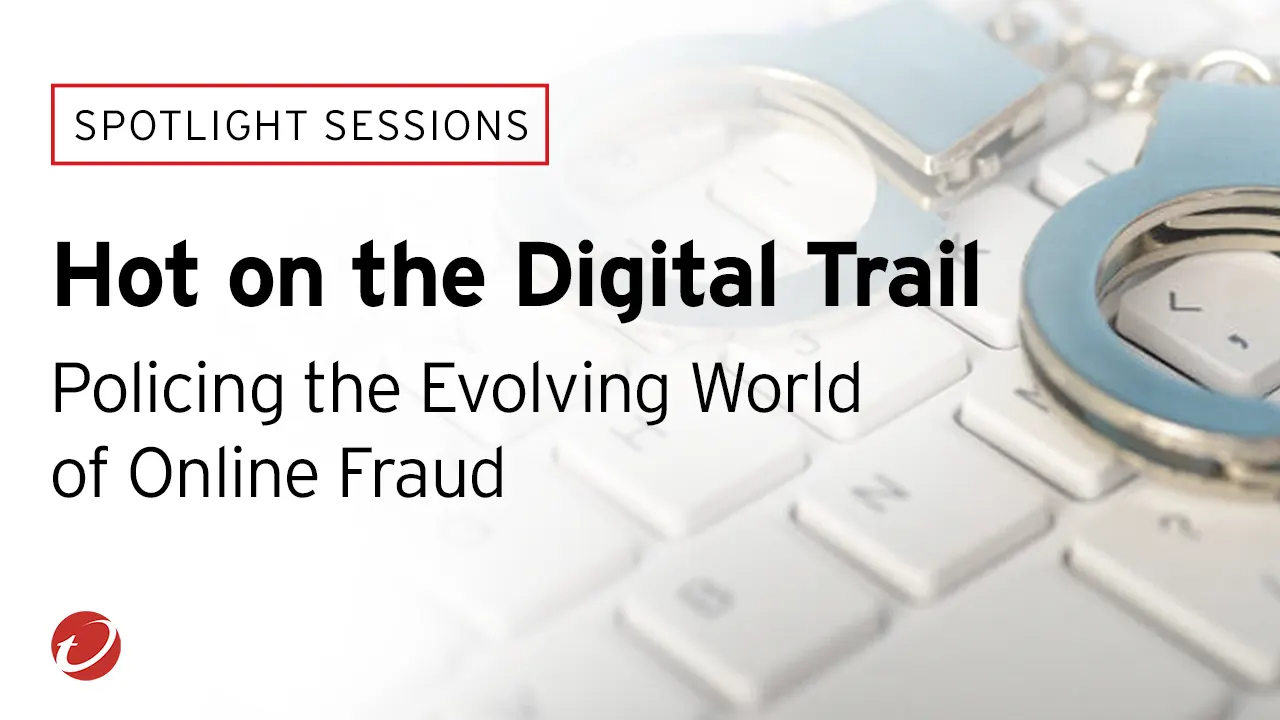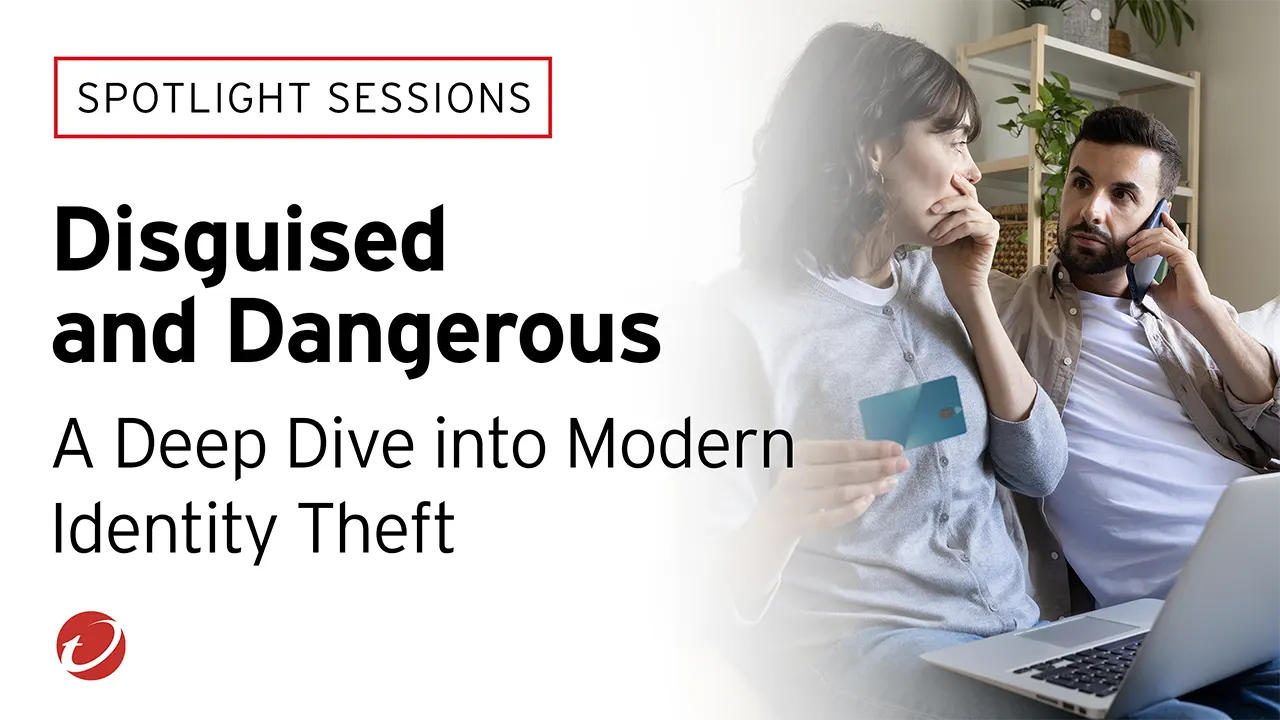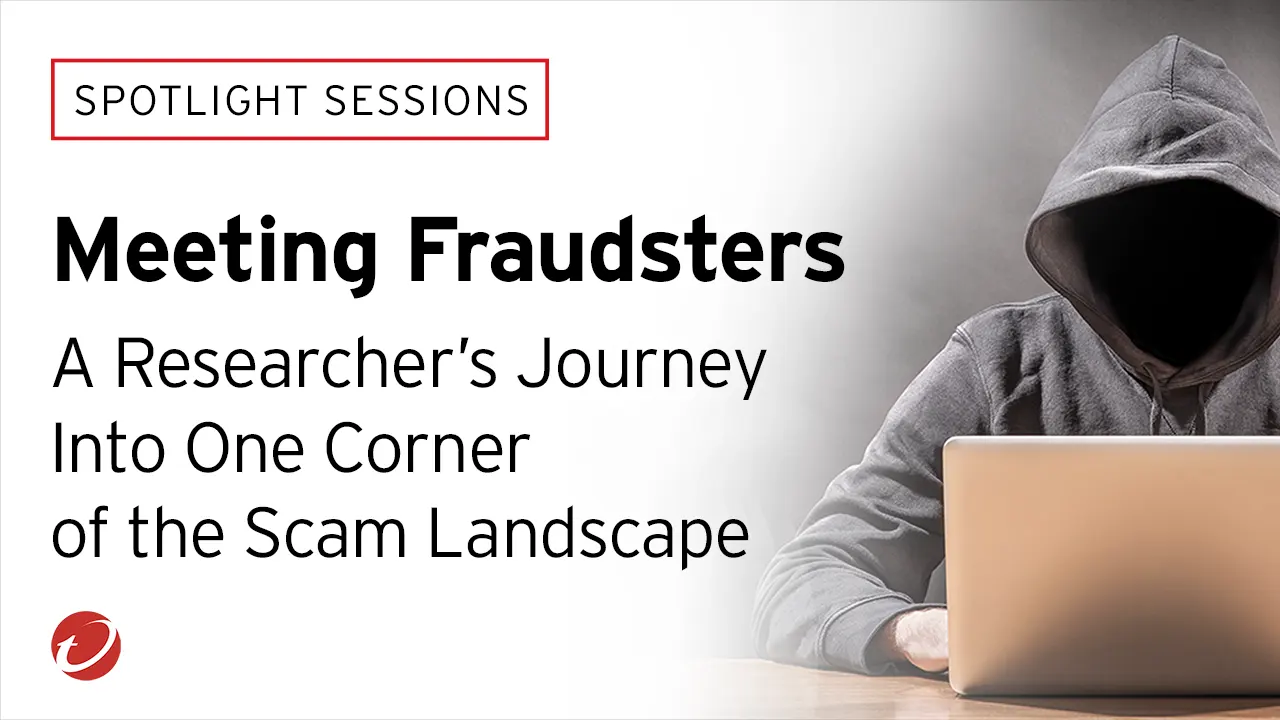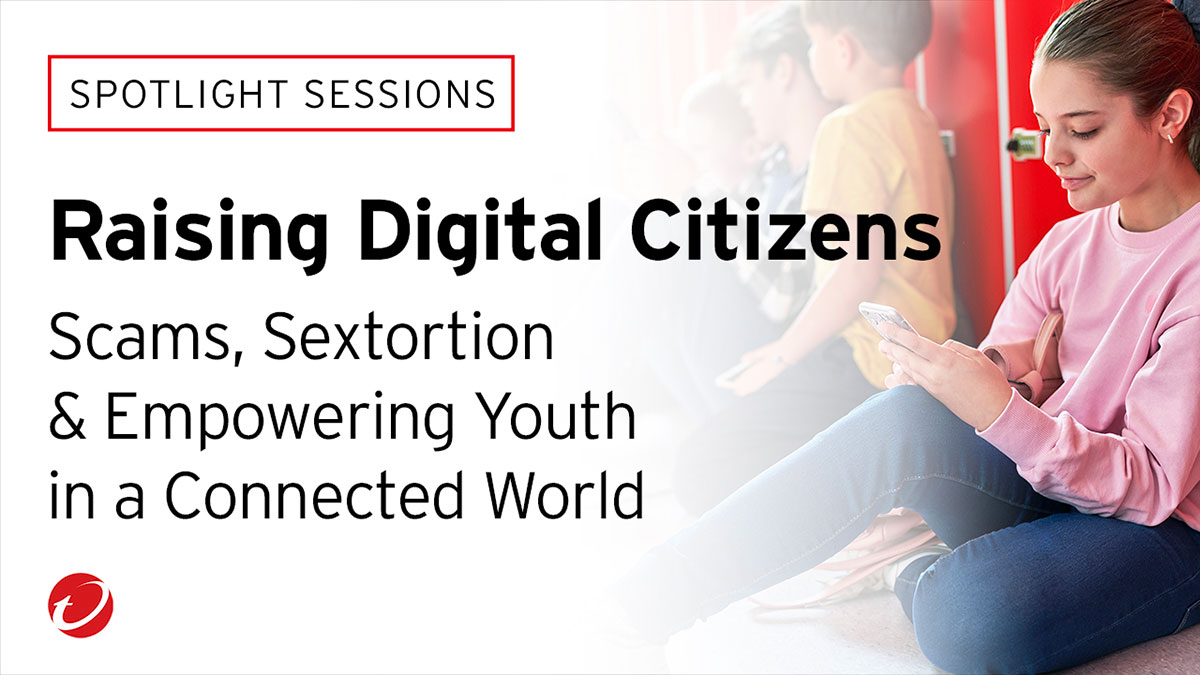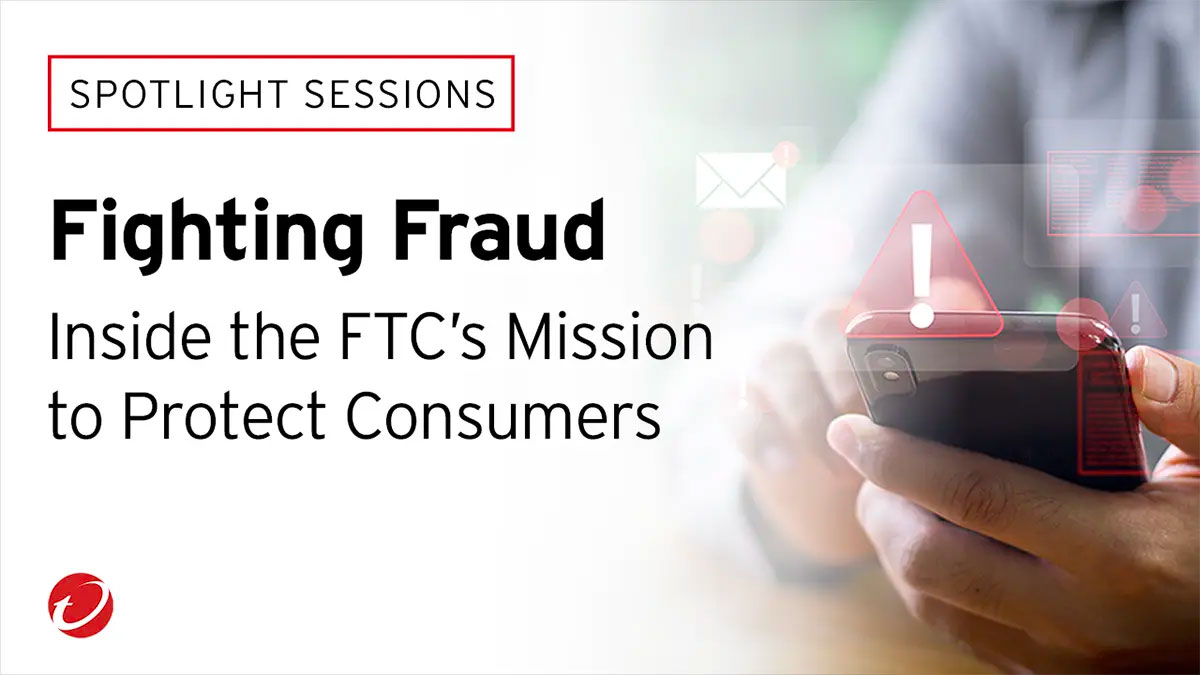- Home
- /
- For Adults
- /
- Spotlight Sessions
- /
- Hot on the Digital...
Hot on the Digital Trail:
Policing the Evolving World of Online Fraud
Recorded on April 14th, 2025
Join Trend Micro’s Spotlight Session, hosted by Marike Kuyper, as she and Constable Brian Mason from the Edmonton Police Service explore the challenges of fighting online fraud globally. Learn how cross-border collaboration is crucial for justice, how scams are evolving, and what the true costs can be for victims of scams.

Key Highlights & Insights
- Complexity of Investigations: Discover how digital fraud investigations unfold, the challenges law enforcement faces, and how international collaboration plays a key role in tracking down criminals.
- Scammers are Master Manipulators: Hear how scammers build trust and manipulate victims over time, often leading to devastating financial losses.
- The Power of Reporting: Learn why reporting scams to authorities is crucial, even if it feels uncomfortable, and how it helps law enforcement track trends, share intelligence, and bring scammers to justice.
About the Guest: Brian Mason

Brian Mason, originally from the southern United States, was educated as an archaeologist prior to moving to Canada. Looking to broaden his abilities, Brian entered the role of emergency services and as a first responder in 2011. Continuously pushing to broaden his investigative abilities Brian joined Edmonton Police Service in 2017 as a constable in a patrol capacity testing investigative techniques and theories gleaned from his studies in archaeology.
In 2019 Brian was injured in the line of duty remitting him to a desk role with the service. During this time, he focused on advancing the scope of fraud investigations, with a particular emphasis on the global impact of fraudulent activities. Brian's work in this area has involved linking numerous scams targeting Canadian citizens to large-scale organized crime syndicates, broadening the understanding of the scope and severity of financial crimes.
Additional Resources
- Internet Crime Complaint Center (IC3.gov) – A resource operated by the FBI, where victims of internet-related crimes can file complaints and access information about various scams.
- Canadian Anti-Fraud Centre – A Canadian resource offering information and reporting tools for victims of fraud, helping to track and respond to scams.
- ReportFraud.ftc.gov – The US federal government's website where you can report fraud, scams, and bad business practices.
Ready to Enhance Your Scam Awareness?
Try our Trend Micro ScamCheck tool to spot suspicious links and guard against online threats – because even the savviest among us can use an extra layer of defense.
At Trend, everything we do is about making the world a safer place for exchanging digital information. Thanks for joining us, and stay safe online!
Full Transcript
Speakers:
- Marike Kuyper (Trend Micro)
- Brian Mason (Edmonton Police Services)
Marike: Alright, I think we are live now, and I want to welcome you to Trend Micro’s Spotlight session, where we aim to shine a revealing light on the hidden dangers lurking in today's digital world. In each of these sessions, we bring together some leading voices from cybersecurity, law enforcement, government, and advocacy organizations to share real-world insights and practical tips.
My name is Marike, and I’m part of the consumer education team at Trend Micro. Today, we're joined by Constable Brian Mason from the Edmonton Police Service. He's a member of the Police Electronic Response Team.
After being injured in the line of duty in 2019, Brian shifted to a desk role where he has dedicated himself to exploring and advancing the scope of fraud investigations, with a particular focus on their global impact and connection to organized crime. Pretty fascinating stuff.
Brian knows a lot about scams and fraud, particularly those affecting and targeting Canadians. So welcome, Brian! It’s a pleasure to have you with us today.
Brian: Thank you. It’s my pleasure, to be honest.
Marike: So perhaps we could start by understanding a bit more about the Police Electronic Response Team. Can you tell us what this team does on a day-to-day basis?
Brian: Absolutely. We originally began as a COVID initiative. The service really started seeing a lot of issues with members going off sick due to COVID exposure when everything was under lockdown.
And obviously, if you have an entire squad of individuals confined to home, you're looking at a significant manpower problem. But the problem is, the calls for service are still piling up.
So, we needed the ability for what we were supposed to be providing our community to actually be engaged. But also, there’s a resource that is untapped for people who could be doing investigations. And so, this unit was actually started as a pilot project to start taking some of those calls for service. The mandate was that anything that didn’t need a physical police presence could still be investigated, but could be done remotely.
Whether it’s from a laptop or done from a division setting, we were able to still conduct those investigations. We originally started with just information files because it was still in its infancy. I was part of that initial pilot project, and we just kept pushing the envelope a little further and further.
Now we really have the ability to take any call for service that does not require physical presence. Everything from your package thefts all the way up to robberies, assaults, major frauds, and things like that. All of it is done remotely from the division. If anything needs to be done outside of there, we can task other units, but we have the ability to actually do everything remotely and work through things step by step.
Marike: Sounds like it has a really broad scope to it.
Brian: Yeah, very much so. That’s why we really started taking a lot of the fraud cases, because they tend to create a backlog. If everyone is tied up on a robbery in progress or a stabbing or bomb calls, the fraud cases that require an inordinate amount of work can stack up.
Those types of cases tend to pile up because no one really has the ability to take them. But we do, because we’re not beholden to the radio. So, when a priority call comes in, we don’t rush out to deal with it. We can start fresh and go through it step by step.
Marike: So what inspired you to focus on digital crime within law enforcement?
Brian: It was kind of a two-pronged approach. My background is in archaeology. I studied in the U.S., earned my degree, and worked in the field a little before moving to Canada. My background and the way I work is very detail-oriented.
Fraud is nothing but detail—it’s about finding those tiny puzzle pieces and moving step by step. When I started looking into a couple of these cases, I wanted to expand and see what I could do. I didn’t like the idea of just going call to call and doing the mundane work. I wanted to expand my role.
The thing is, as I started doing that, I saw the real impact that fraud has on people. I also saw that the mindset of a lot of people was that it’s the "greasy fraud"—no one really wants to deal with it, and it’s a victimless crime. I kept hearing this adage, and I realized it’s not a victimless crime.
Fraud is not just some data stream going back and forth. There’s no real difference between a person who’s been stabbed on the street and is actively bleeding out, and a fraud victim who’s losing their finances, their identity, or even the ability to get a home, car, or cell phone because their identity’s been so badly compromised.
So, it really hit home for me. I just wanted to see what I could do to help. That’s why I started pushing the envelope.
Marike: I think that’s wonderful because it sounds like you’ve got a real heart for the victims of these crimes, and you have real empathy for what they’re going through. We definitely feel the same way. The impact of these types of crimes—fraud, scams, etc.—can be everything from emotional to monetary. It’s not necessarily physical harm, but the impact is still really great.
So, what types of online scams or fraud are you seeing most frequently, and how has this changed over the past few years?
Brian: Right now, a lot of what we’re seeing are investment scams and job scams. Crypto investment scams are one of the primary ones, where they lure people in to invest on a crypto platform and slowly pull money out of them, bleeding them dry.
We’re also seeing what I refer to as task-based scams. In these scams, the victim is offered a job, but they have to invest in the platform first. It looks enticing, and they get roped in. These scams can drag on. In many cases, we’ll see these scams run for 3 months, and within that time, scammers can abscond with 1 to 3 million dollars easily.
Marike: Per victim?
Brian: No, globally. In Canada and other countries, similar platforms can pull in even higher amounts depending on the case. But the ones we see in Canada are usually raking in about 1 to 3 million dollars within a 1–3 month timeframe.
Marike: So they really are playing the long game with the victim.
Brian: Yes, they slowly bleed them dry. You often hear about “pig butchering” scams and “romance” scams, as well as crypto investment scams. They just keep pulling more and more money out of individuals, starting with smaller payments—typically anywhere from just a few hundred dollars. They’ll entice individuals to see how they could potentially invest.
If they’re unsure, they might start with a smaller initial investment, say $500, just to get them on the platform. Once the victim becomes more comfortable, the amounts increase—$15,000, $20,000, or even more. It’s not uncommon for some victims to invest upwards of $100,000, or in some cases, $900,000 to $1 million each.
Marike: And I know you mentioned the term “pig butchering.” I know this is a term that came out of China, sort of this idea of fattening up a victim before, you know, taking as much from them as you possibly can. It’s a little bit of a shaming term. Unfortunately, we don’t really love that this is now the term we’re using to describe this. But can you tell us just really, briefly, how this type of scam, this conversational, social-engineered scam might get started? How does it work?
Brian: Yep, absolutely. I’m of the same mindset. I don’t like the term. I don’t typically use it. Even in the charge packet I did recently, we did a press release a couple of weeks ago on a big investment scheme task-based jobs scam, where we laid charges on five individuals in BC.
But the term “pig butchering,” as it relates to these scams, involves an individual who’s a master of social engineering and manipulation. They’ll start conversations with someone, usually buttering them up with compliments or promises of great returns, wonderful guarantees of investment. They work on gaining the victim’s confidence, slowly building that relationship, whether it’s a romance scam or another type.
Once that trust is built, they begin the scam. They start slow at first so that the person isn’t shocked. If they start large, the victim would get suspicious and likely run away, but by starting slow, they can keep them in the game. The scammer will keep giving just a little more encouragement, creating a sense of urgency.
Marike: So, they really build trust and relationship. How they make those first few initial contacts isn’t like the immediate, obvious tell in email scams or text message scams. They come at this from a more benign form of communication, earning trust over a long period of time before the ask.
Brian: Exactly. I’ve seen cases where scammers have talked to victims for months before asking for a single dime. By that time, the victim feels like they know this person, and when we ask, “Have you ever met this person in real life?” the answer is usually no.
Marike: I’m glad we’re talking about this because it’s some of the lesser-known tactics. The general public is more aware of the things they can immediately pick out in their inbox or from messages they receive, but this is much sneakier. It doesn’t often get the public’s attention, or they don’t know about it.
So, one question I have is, without revealing any sensitive details, can you give us an idea of how an investigation unfolds on your side? How do you trace digital footprints or coordinate with other agencies, for example?
Brian: That’s a very, very good question. And this is one that I always try to explain to the individuals I work with, whether I’m investigating their file directly or assisting another member. I try to convey the timeline they’re looking at and what steps we’ll ultimately have to take, because it’s a shock to many people—it’s not like what you see on CSI.
These things don’t get completed in 24 to 48 hours. It takes a while. Sometimes our fastest return is about 6 months; other times it can take 1, 2, or even 3 years to find every piece. But ultimately, we have to look at what data we have now and what can be acted on.
So within Canada we're confined by what it says in the Canadian criminal code, as far as what we can actually do. So if, say, we're dealing with an investment scam where we know a platform online was used. We know there were telephone and emails involved. And there were payments that were made. Okay, well, what kind of payments are we looking at? Were those payments in cryptocurrency? Were they done through a financial institution at a bank or a payment application system. Okay, so we know those things we can follow up with all of those. If I go to a bank and say, hey, I want the banking information for this account. Well, that bank's gonna tell me to pound sand and come back for the warrant because it's private information. We cannot, as law enforcement, take that information for our investigative use, because the law says that that data belongs to the bank and to its client.
So, what I have to do is I have to sit down, and I have to draft out a document it's called an information to obtain. And it's literally a story of the investigation that explains to a judge that here's what's happened, here's the crime that's been committed, or that we suspect has been committed. And this is data that we know exists out there. And this is why we think we should have access to that data. And then we take that to the judge. Judge reads over it and says, Yeah, that's acceptable or no.
And if they think that that's acceptable, they sign off on the warrant, they hand it to us and then we give that to whatever company we're looking at. Now that typically has a timeframe attached to it of minimum, usually about 30 days. Sometimes it can be even longer.
Marike: That company actually has to produce the data.
Brian: Once we get that, then we look at all the data we have. Now we're looking at the next line, and the process repeats over and over. Now with it we look at a variety of things, from addresses, phone numbers. to IP addresses involved and any kind of correlation point that we can.
So, if we see a name pop up well, we're going to then communicate with our external partners. Other police agencies, either here in Canada or abroad and ask, do you have any dealings with this individual? What about this address or this phone number? What do you have? And we do quite a bit of collaboration with other agencies. And we'll talk with agencies here in Canada. We'll talk with agencies in the Us. Or wherever else.
With the current digital age, we're seeing a lot more collaboration between agencies where we can actually talk with them. We can share data. We can move a lot more freely. And it really depends upon the country. Some of some of those agencies are in countries that are really bound by heavy restriction, and so they can't really cooperate and talk to us as freely. But others, you know we can. We can go to them. And they're like, Yeah, here you go, you know, whatever you need. You know, it's not uncommon for us to contact, say, a police agency in Australia or in the Island nation of Seychelles and get cooperation out of them, and it's getting better. It still has a lot of steps to go for that collaboration to be efficient to where we can actually get data faster.
Marike: Does this collaboration with other entities sometimes speed things up, or can it complicate the investigative process?
Brian: It can really go either way. Sometimes it greatly enhances the process, especially if we're working with an agency or a country that will speak freely with us. In those cases, we can speed things up really fast. They may have the ability to get things through their judicial process faster than we can.
Other times, though, I had one case where we sent an information package to a country, and they got back to me a year later.
Marike: So investigations are taking longer than victims might expect when they report a scam?
Brian: Yes, absolutely. And unfortunately, especially in the digital world, if things go too long, we may risk losing any potential data. In Canada, we typically have a retention span of about 7 years. Financial institutions and many companies maintain data for 7 years, sometimes a little longer.
But if it goes past that 7-year mark, the chance of us getting any data is very small. Every now and then we get lucky, but if we're waiting for collaboration from another agency, and it goes past that point, unfortunately, we’ve lost the opportunity, and we have to look at other avenues.
Marike: Yeah, you can only do what’s within your jurisdiction, and then you’ve got to wait for others to give you the information. So how often do these types of investigations end in an arrest? Is that common or not common?
Brian: With most of these, the vast majority of them will end up with a warrant for arrest. Now whether or not it's a warrant we can act on is another story. A lot of the scams we’re seeing lately are initiated outside the country, such as in Nigeria, China, Vietnam, the Philippines, and India—some of our top hotspots.
But they usually have one or more entities inside Canada, or at least North America, involved in some way, either as a money mule—someone who’s moving money for the scammer, usually allowing them to use their financial accounts—or someone else involved in things like the direct chat, account takeovers, etc.
In those cases, absolutely, we can act. I’d say maybe 50% of the files I look into have a player within North America, the other 50% are purely overseas, and there’s nothing we can act on.
Even if it’s in a place where we can’t act, like a country that doesn’t cooperate with us, we can still send intelligence information through Interpol to let everyone know about the scammer, and we can put out local warrants here, so if they ever try to come to Canada, we can deal with them then.
Marike: So for those scams where the scammers are located internationally, and for the percentage where there isn’t a player within North America or within Canada, does the information you share ever lead to an arrest by authorities within that country, such as the Philippines, Vietnam, or China?
Brian: Sometimes, it really depends on the country and the file. Some countries have a high level of corruption. For example, if you have a police officer in Lagos, Nigeria, going to do a door knock to arrest a suspect based on the intelligence we have, and if that officer is just looking for a bribe, then we’re done.
But we do see action from time to time, though we usually don’t hear about it. I had a case with a romance scam where we knew it was perpetrated by five individuals in Lagos, Nigeria. I sent an information package through Interpol to Nigeria, and I never heard anything back. However, my complainant received a phone call from the scammer, who was very angry because he had just done 6 months in prison in Nigeria for that scam. We had no idea, and it was the scammer himself who told our complainant that he got arrested.
Marike: Well, it must be great to hear sometimes that at least there’s something actionable happening. But I’m sure everyone listening would be heartened to know that there are consequences taking place for these scammers. But it sounds like the deck is stacked against you, in a sense. Because they’re crossing international borders, you’re very reliant on other countries to take action. It’s not necessarily within your direct power to take action against the criminals. That must not feel so great sometimes.
Brian: No, and it’s honestly very frustrating for the victims. And that’s where we, as investigators, have to wear multiple hats.
It’s one thing for me to sit here and surf through 4,000-plus pages of data for an investigation and just look at it as hard data and facts. My role is to find who did it and make sure the bad guys are held accountable. But I also have the role of being a public servant, ensuring that the victim is taken care of.
Let’s go back to the analogy of the stabbing victim. We take them to the hospital for treatment and care. What about the fraud victim? I can find the person who did it, just like I can with the stabbing, but I also have to make sure that I provide the care as well.
We have to make sure the victims understand that, okay, our hands may be tied here, but here’s what we can try to do, here’s what we can help with. We’ll try to put them in connection with services, or at least let them know, “Hey, we know they’re not going to be held accountable here, but we’re going to put as much information out as we can. We’re going to expose them as much as we can with the international community and our partners.”
And on the off chance they come here, here’s what we can do. It’s not enough. It’s never going to be enough because their personal space has been violated, their identity has been compromised, and in some cases, their lives have been ruined.
But we have to try and do whatever we can. And even if it’s just sitting on the phone with them, or sitting in person with them, and listening to them—letting them rant and rave for half an hour—that’s okay. Because at the end of the day, we have to be there for them.
Marike: Sounds like supporting victims who come forward is just as important to you as the investigation side.
Brian: Yes, absolutely. At the end of the day, they are the victim.
Marike: Are there any particular resources or programs you point them toward? You know, toolkits or special organizations for Canadians who are dealing with this and have been victims of fraud?
Brian: Yes, definitely. There’s a number of things we can do depending on the issue. If it’s related to identity fraud or personal credit issues, we always refer people to one of two types of services—paid services for identity and credit monitoring, as well as free services.
I always recommend that people sign up for one or both of these services. Personally, I use them. Thankfully, knock on wood, I haven’t been a victim of identity fraud, but if I ever am, I’ll know about it because I have credit and identity protection.
You have Equifax and TransUnion, which are great paid services. You also have free services like Credit Karma and Experian, and a quick Google search will show you options.
When doing a Google search, be cautious and don’t click on the sponsored links. Scroll down and find the unsponsored links. Sponsored links are sometimes ads from scam sites.
Marike: And for those who don’t know, you get those sponsored links at the top of your search engine. They’re the ones that are paid for by businesses, which could be legitimate or scams. You’re suggesting we scroll down to get beyond those sponsored links.
Brian: Yes, exactly. It’s always better to be safe than sorry. You can check the sponsored links later, but you need to scrutinize them more carefully. Otherwise, there are a lot of trusted resources available. For example, the Internet Crime Complaint Center (IC3.gov), run by the FBI, is a great resource. They provide lots of helpful information and updates on scams.
The Canadian Anti-Fraud Centre also has a lot of resources on their website. I always encourage people who’ve been victims of scams to report them to both, even if they’re in Canada. You can still report your scam to IC3, because it puts it in their database, which helps us spot trends.
Marike: It’s important for law enforcement to have visibility on the landscape.
Brian: Absolutely. Because the biggest thing is, if we don’t know about it, we can’t look into it. If we don’t know what’s happening, there’s nothing to investigate. The only way we’ll know is if people tell us.
It can be a scary thing, and a lot of people feel ashamed. But there’s no shame in it. These scammers are master manipulators. They know exactly what they’re doing. This is their full-time job, and they’re good at it.
If they weren’t good at it, you wouldn’t have people like me getting paid to do what I do. I’d love the day when there’s no more need for this job, and they say, “We don’t need you anymore because there are no more scams.” That would be wonderful.
But other ways that people can really start looking to protect themselves, there's website checkers out there that'll give you an indicator if it's a scam. One that I frequently use is scamadvisor.com. You can look on there and it’ll tell you potentially, if the website's a scam or not.
If you have been the victim of a remote desktop connection scam, that’s where these tech scammers get you to download a program and then they will start moving your mouse around to show you how your computer's been hacked. It hasn't been hacked. It’s just people who are on there actually hacking your system at that point. There is a program that people can download. It's called Seraph Secure.com. That is a program that people can download, and it's free, and it will actually cut out all of those connections. So that their device will now be secure.
Another one that they can check out is a password and account checker that I always recommend people to see if there's a data breach that's going on with that email or password. It's a difficult one for me to pronounce. But if you look into it, go into Google and type in, have I been PWNED. You'll be able to find it. And that's a great resource. Just to see if there is a data breach and see if you need to change your password, which I always recommend. People do at least every few months.
Marike: I think that’s wonderful to know. And just to plug, we’ve got some great free tools at Trend Micro as well. You were talking about a URL checker, and Trend Micro has one too—a global site safety checker. It’s free to the general public, and they can simply copy and paste a URL into the tool to check if a website might be potentially a scam.
But you’re right—there are some great security tools out there that can tell you if you land on a malicious website. For example, Trend Micro has one where you can literally take a screenshot of anything on your phone, and it will automatically check and tell you if it looks like a scam, whether it's a conversation or an ad. It can even help identify scams in romance scams.
And, for those romance scams you were mentioning earlier, there’s also Deepfake Inspector, which can check if the image or video you’re looking at is manipulated with AI tools. This software can alert you if it’s a deepfake.
So, can you tell me, as we’re wrapping up, do you have a memorable case you’ve worked on that you can share with us? You seem to have such a heart for these victims. Perhaps there’s one you could describe for us and tell us how it unfolded and what happened in the end?
Brian: Yeah, absolutely. One case that really stuck with me was from 2022. It involved a romance scam, and it had been going on for quite some time.
The initial contact was made by an individual who had come to Canada from the Philippines and befriended an elderly lady here in Edmonton. He told her he was being deported and wanted her to check in on his friend over WhatsApp.
This contact quickly started saying things like, “You sound like a wonderful person. I want to get to know you more.” They started developing a relationship over WhatsApp, and that went on for about 3 to 4 months. Then, suddenly, the scammer said, “I really want to meet you, but I have this hurdle I need to get over,” and the first one was a customs fee.
He started asking for money, and initially, it was through gift cards, but then it transitioned to wire transfers, then crypto, and a bunch of other platforms.
What we found was that this victim was actually sending money to another victim who was also being manipulated by the same individual running the exact same scam. The second victim thought, “Oh, I’m getting money for my love overseas,” and sent it off to the scammer’s platform.
So it became this large web of money mules.
Marike: Very common.
Brian: Yes, very much so. That’s usually how they do it—victim A sends money to victim B, who then sends it to an actual money mule, someone who’s culpable in the scam, and it eventually makes its way to the main target.
Marike: Oh!
Brian: They slowly developed the relationship, and the victim kept giving more and more money. As they became more involved, they grew more desperate. The scammer could see this, so they started playing on that fear and urgency.
After about a year and a half, our victim had lost $220,000.
Marike: And I’m sure that was a significant amount of money for that victim.
Brian: It was. She had exhausted every bit of her finances. She had remortgaged her home for the scammer. And you’re talking about someone who was living on a pension, in her seventies. She had paid off her home, but now she was carrying a lot of credit card and line-of-credit debt.
Her ability to repay these debts was very limited.
And when you’re considering that it was just one victim, remember what I said about victim A, victim B? There were several victims all wrapped up in the same scam. I continued to work with our victim, checking in with her regularly. She kept sending money because she was just so lonely. Even during the investigation, while we were digging through the data, she was still sending money to the scammer because of her emotional need.
Ultimately, we traced all the cryptocurrency payments and wire transfers, and they were going to five individuals in Lagos, Nigeria.
The main scammer’s cryptocurrency wallets matched the social media accounts I found online—these guys always leave their social media for us to find. I could see that this person was the one who had been communicating with her.
The victim was so deep into the scam that when I approached her and said, “You don’t understand, you’re sending money to a scammer,” she said, “Well, I just want to see his photos.”
We discovered that she had called him out as a scammer, and he admitted it, even sending her photos of himself. They were edited photos—license plates and other details were cropped out.
I told her, “If you want those photos, here’s his Instagram with the unedited ones, where the license plate is still visible.” It was the same photos she had been paying for.
She eventually came around and realized the devastating impact this had on her. To this day, she’s still struggling, but I check in with her every couple of weeks to make sure she’s okay.
Marike: Brian, it sounds like you have such a passion for supporting people who have been impacted by this.
Brian: Yeah, definitely.
Marike: To me, that sounds unusual for someone in your position, who’s probably extremely busy and has a lot on his plate, to continue to reach out and support victims after the fact. That tells me you really care, and you have a big heart for the work that you do.
Brian: Yeah, yeah. And I mean, sure, it eats up time. My queue for files is quite heavy, but at the end of the day, if I can take 10 minutes out of my day to call someone and check in on them, it could make the difference between them falling into a depressive state or pushing forward.
It’s traumatic for people, and sometimes just listening to them can make a world of difference.
Marike: And I suppose you’re probably recommending to anyone who’s been impacted by a scam to talk to family and friends, seek support from professionals if needed, because these things can be so far-reaching into our personal lives.
Brian: Yes, absolutely. The biggest thing is to talk about it. It’s not shameful. Anyone who wants to shame or blame a victim doesn’t understand what it’s like to be trapped in these scams.
I scroll through scam chats all the time, and I can see how convincing these messages are. The only reason I know it’s a scam is because I work in the industry. Otherwise, I’d be just like any other victim.
Marike: We know that victims can be anyone—from CEOs to security professionals, to anyone. They can target anyone. The idea that someone is too gullible or that it's their fault just isn't true. Anybody can be the victim of a scam.
Brian: Oh, absolutely. I know police officers who’ve fallen victim to scams. I know prosecutors who’ve been scammed. It’s not because they’re dumb or greedy—those are misconceptions people often have about scam victims.
You’re not dumb. You were manipulated by a master manipulator, and it wasn’t greed. Fraud isn’t about greed. It’s about need.
Look at the global economy—people are struggling with rent, mortgages, and grocery prices. They need money to survive, so they look for other sources to try to live more comfortably.
Marike: Cyber criminals potentially present them with an added income stream or way to make more money, which is very enticing. We can all see how that happens. So, Brian, one last question: If viewers remember only one thing from this conversation, what would you want them to know about online scams and working with law enforcement? What’s your key takeaway?
Brian: One of the key takeaways for people is two-pronged. First, stop, think, ask, wait, and collaborate.
If you see something, stop and think for a second. Is it too good to be true? As the old saying goes, if it sounds too good to be true, it probably is.
Stop and think about it. Ask your friends and family, “Hey, I saw this. What do you think about it?”
Wait a little bit, so you can go back and rethink it. Collaborate with your loved ones to determine if this is legitimate.
The scammer, on the other hand, will push you to act immediately, creating a sense of urgency. If it can’t wait 12 hours, it’s probably a scam.
The second thing is, don’t feel ashamed if you’re the victim of a scam. Report it to us, report it to IC3, and the Canadian Anti-Fraud Centre. We need to know about it.
Nine times out of ten, people who are victims of scams won’t report them to us.
A big Ponzi scheme we investigated had over 600 victims across Canada, but only 8 people reported it.
Marike: There is a lot of underreporting. We know that’s an issue.
Brian: Exactly.
Marike: So definitely, you’re saying: take a pause, talk to those around you who care, get a second opinion, and if something happens, don’t hesitate—report it.
Brian: Yup, that’s right. You’re not going to get in trouble for filing a report. Even if nothing can be done right away, at least we can see the trends, and maybe down the road, your report will be pivotal in connecting the dots.
Marike: That’s really wonderful to know. Brian, we really appreciate you taking time out of your busy schedule to speak with us today. We’re grateful for the work you do and for sharing your insights. We also appreciate the challenges you face while doing this work and supporting victims.
For those who tuned in, we hope you’ve taken away some valuable information. Please note that we’ll have more sessions coming up. Our next one is on May 7th, when we’ll be speaking to the CEO of the Identity Theft Resource Center. Another important conversation, and we look forward to having you join us then.
Brian, any parting words before we end?
Brian: No, I can’t think of anything. It’s been a pleasure.
Marike: Alright, wonderful! Thanks so much, and thank you, everyone, for joining. We’ll see you next time. Take care.
Webinar Recordings
Myth vs. Reality: A New Look at Scams and Older Adults
With guest, Russell Slater, National Council on Aging (NCOA)
Recorded: March 11, 2025
Hot on the Digital Trail: Policing the Evolving World of Online Fraud
With guest, Constable Brian Mason, Edmonton Police Service
Recorded: April 14, 2025
Disguised and Dangerous: A Deep Dive into Modern Identity Theft
With guest, Eva Velasquez, CEO, Identity Theft Resource Center
Recorded: May 7, 2025
AI Powered Scams: What a Threat Researcher Wants You to Know
With guest, Ryan Flores, Senior Manager, Forward Looking Threat Research, Trend Micro
Recorded: June 11, 2025
Meeting Fraudsters: A Researcher’s Journey Into One Corner of the Scam Landscape
With guest, Olivier Beaudet-Labrecque, co-founder of Foreign Swiss and Dean at the Institute of Economic Crime Investigation
Recorded: July 16, 2025
Raising Digital Citizens: Scams, Sextortion & Empowering Youth in a Connected World
With guest, Will Gardner, CEO of Childnet
Recorded: August 5, 2025
Fighting Fraud: Inside the FTC’s Mission to Protect Consumers
With guests:
- Karen S. Hobbs
Assistant Director, Division of Consumer and Business Education
Federal Trade Commission - Nicholas Mastrocinque
Consumer Sentinel Attorney and Manager
Federal Trade Commission - Patti Poss
Senior Attorney
Federal Trade Commission
Recorded: September 10, 2025
Scam Trends & Action: Insights from Australia’s National Anti-Scam Centre
With guest, Jayde Richmond, General Manager, Australian Competition and Consumer Commission’s National Anti-Scam Centre
Recorded: October 8, 2025


